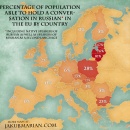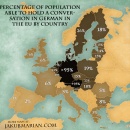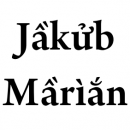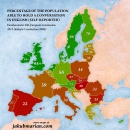 |
Esperantists often overestimate the probability of being able to speak Esperanto
After I published my previous article explaining the pros and cons of learning Esperanto, one of which is that you are not likely to use (...)
June 12, 2014 – Jakub Marian – Esperanto
|
 |
Map of the percentage of population able to speak Russian in the EU by country
Russian used to be the first foreign language most inhabitants of the former Eastern Bloc learned. Understandably, the number of Russian (...)
|
 |
Learning Esperanto: Is it worth it?
Esperanto is the most widely spoken constructed language (unless you count Modern Hebrew as a constructed language). In this article, I (...)
June 5, 2014 – Jakub Marian – Esperanto
|
 |
Map of the percentage of people speaking German in the EU by country
German used to be a very popular language among educated people from all over Europe before the 20th century, but after World War I, and (...)
|
 |
Vietnamizer – make your writing look Vietnamese
Vietnamese is an interesting language in that it uses the most diacritical marks of all languages that use the Latin alphabet in their (...)
|
By the way, have you already seen my brand new web app for non-native speakers of English? It's based on reading texts and learning by having all meanings, pronunciations, grammar forms etc. easily accessible. It looks like this:
 |
Map of the percentage of people speaking English in the EU by country
Some native English speakers’ attitude towards learning foreign languages could be summarized as “why should I learn a foreign language if (...)
|
 |
‘Both’ vs. ‘either’ in English
Learners of English quite often confuse the words “both” and “either”, probably because these tend to be translated using a single word (...)
May 27, 2014 – Jakub Marian – English
|
 |
“I wish he did” / “I wish he would do” in English
English conditional is one of the most common sources of mistakes for non-native speakers. The most common pattern for conditional (...)
May 25, 2014 – Jakub Marian – English
|
 |
‘A couple is’ / ‘a couple are’ in English
A common mistake: English learners see “a couple”, which is in the singular, and assume that the verb must be in the singular, too. (...)
May 23, 2014 – Jakub Marian – English
|
 |
‘Boring’ vs. ‘bored’ in English
My mother (who learns English as a second language) asked me how to use words like “bored” and “boring”, “annoyed” and “annoying”, etc. (...)
May 18, 2014 – Jakub Marian – English
|

